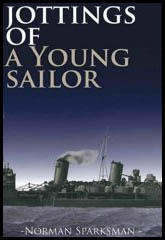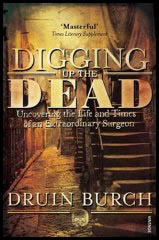Spartacus Review
Volume 16: 10th April, 2008
Biography

Title: Jottings of a Young Sailor
Author: Norman Sparksman
Editor:
Publisher: Melrose Books
Price: £12.99
Bookshop: Amazon
Spartacus Website: Royal Navy
Category:
One of the main functions of the Royal Navy during World War II was to defend from enemy attack Allied merchant shipping carrying vital war supplies to and from the United Kingdom. This it did in two ways. Firstly, it organised merchant ships into convoys escorted by a protective screen of warships and secondly by arming the merchant ships themselves so that they had some means of self defence. This book is an account of Norman Sparksman's experiences whilst serving in the Royal Navy. Firstly as a seaman during his officer training programme on HMS Edinburgh escorting convoys to the Russian Arctic ports of Murmansk and Archangel; and later, having been commissioned, serving in the branch of the Navy responsible for the arming of merchant ships.Surviving the loss of his ship in action while defending an Arctic convoy and the privations of an enforced two month stay in primitive conditions on the desolate snowbound North coast of Russia he then had to face the perilous voyage back to the UK on a destroyer sailing independently with no means of help in the event of mishap. Having arrived home safely the author completed his officer training at HMS King Alfred and the Royal Naval College Greenwich. He was then posted to the convoy assembly point in Belfast Lough to assist with the arming of the merchant ships assembling there for convoy. In April 1945 he was posted to the busy port of Calcutta in India, again to assist in the servicing of defensively equipped merchant ships. Demobilised in August 1946, the author returned home to civilian life. No more dodging bombs and shells. No more wondering if a torpedo would dispatch him to the next world.

Title: Digging up the Dead
Author: Druin Burgh
Editor:
Publisher: Vintage
Price: £8.99
Bookshop: Amazon
Spartacus Website: Astley Cooper
Category:
A tearaway young man from Norfolk, Astley Cooper (1768–1841) became the world’s richest and most famous surgeon. Admired from afar by the Brontës and up close by his student Keats, his success was born of an appetite for bloody revolutions. He set up an international network of bodysnatchers, won the Royal Society’s highest prize and boasted to Parliament that there was no one whose body he could not steal. Experimenting on his neighbours’ corpses and the living bodies of their stolen pets, his discoveries were as great as his infamy. Caught up in the French Revolution, and in attempts to bring radical democracy to Britain, Cooper nevertheless rose to become surgeon to royals from the Prince Regent to Queen Victoria. Setting the past against his own reactions to autopsies and operations, hospitals and poetry, Burch’s Digging Up the Dead is a riveting account of a world of gothic horror as well as fertile idealism.
